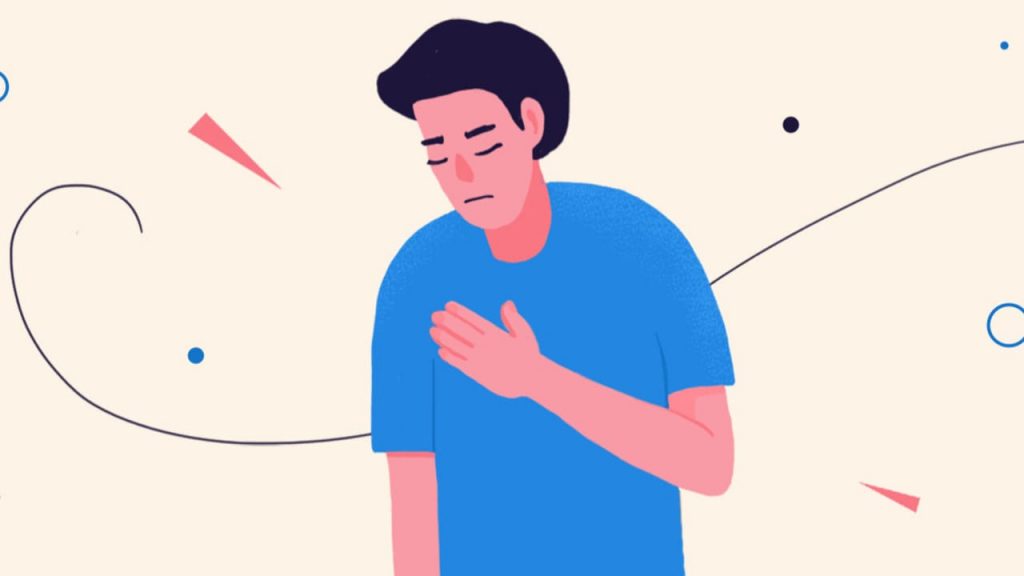Do you ever get chest pain from anxiety? If so, you’re not alone. Many people experience this type of pain, and it can be quite uncomfortable.
In this post, we’ll discuss what does chest pain from anxiety feel like and provide some tips on how to manage it. Keep reading to learn more!
What Are The Symptoms Of Chest Pain From Anxiety?

Chest pain is one of the most common symptoms of anxiety. It can feel like a tightening or Pressure in the chest, and it may be accompanied by palpitations, shortness of breath, or dizziness.
While chest pain is often harmless, it can be a sign of a more serious condition, such as a heart attack. If you experience chest pain that is severe or lasts for more than a few minutes, you should seek medical attention.
Chest pain from anxiety is often made worse by stress, so it is important to find ways to relax and reduce stress in your life. Exercise, relaxation techniques, and counseling are all effective methods for managing anxiety and reducing stress. If you are struggling to manage your anxiety on your own, talk to your doctor about treatment options.
What Does Chest Pain From Anxiety Feel Like?
Many people who experience anxiety also suffer from chest pain. The chest pain associated with anxiety can feel like a sharp, stabbing sensation, or it can be more of a dull ache. It may also be accompanied by shortness of breath, rapid heartbeat, or sweating. In severe cases, the pain may radiate to the arms, neck, or jaw.
For some people, chest pain is the only symptom of anxiety, while for others it is just one of many. Regardless of how severe the symptoms are, however, all chest pain should be taken seriously and evaluated by a doctor to rule out any underlying medical conditions.
Once any serious medical conditions have been ruled out, there are treatments available that can help to manage the anxiety and reduce the associated chest pain.
Common Causes Of Chest Pain From Anxiety
One of the most common symptoms of anxiety is chest pain. This can feel like a sharp, stabbing sensation or a dull ache and can range from mild to severe. The pain may be constant or may come and go. It can be difficult to determine the exact cause of chest pain, as it can be caused by a number of factors.
One common cause is hyperventilation, which is when you breathe too quickly or shallowly and do not get enough oxygen. This can lead to a tingling sensation or pain in the chest. Another cause of chest pain is muscle tension. When you are anxious, you may tighten your muscles, which can lead to pain and discomfort.
Chest pain can also be caused by gastric distress, such as GERD or heartburn. This happens when stomach acids leak back up into the esophagus and irritate the lining, causing pain. If you are experiencing chest pain, it is important to see a doctor to rule out any serious medical conditions.
However, if your doctor determines that the cause of your chest pain is anxiety, there are treatment options available. Relaxation techniques, such as deep breathing or meditation, can help to reduce muscle tension and relax the mind.
Cognitive behavioral therapy (CBT) can also be effective in treating anxiety and related symptoms, such as chest pain. If you are struggling with anxiety-related chest pain, talk to your doctor about treatment options that may be right for you.
How Can You Tell If The Chest Pain Is Related To Anxiety Or A More Serious Health Issue?
When you experience chest pain, it can be hard to discern whether the cause is physical or psychological. If you are generally healthy, it is more likely that the chest pain is related to anxiety. However, if you have a history of heart disease or another cardiovascular condition, chest pain may be a warning sign of a more serious health issue.
If the pain is accompanied by shortness of breath, sweating, or nausea, it is important to seek medical attention immediately, as these may be signs of a heart attack.
However, if the pain is mild and does not radiate to other parts of the body, it is probably not causing for alarm. In either case, it is always best to err on the side of caution and consult with a doctor to rule out any serious health concerns.
What Should You Do If You Experience Chest Pain From Anxiety Attack?
If you experience chest pain during an anxiety attack, there are a few things you can do to ease the symptoms. First, try to take some slow, deep breaths and focus on relaxing your muscles.
It can also help to stay calm and avoid any sudden movements, as this can exacerbate the chest pain. If the pain is severe, you may want to sit or lie down in a comfortable position.
You can also try massaging the area or applying heat or cold to help ease the discomfort. If the chest pain is accompanied by other symptoms such as shortness of breath, sweating, or dizziness, it’s important to seek medical attention immediately, as these could be signs of a heart attack. However, if the chest pain is only related to anxiety, following these steps should help to alleviate the symptoms.
Treatments For Chest Pain From Anxiety Disorders Or Panic Disorders
Chest pain is a common symptom of anxiety and panic disorders. While the exact cause is not known, it is thought to be due to a combination of factors, including muscle tension, rapid breathing, and an increased heart rate. The good news is that there are a number of effective treatments for chest pain associated with anxiety and panic disorders.
Cognitive-behavioral therapy (CBT) is often recommended as the first line of treatment. This type of therapy can help you to identify and change the negative thoughts and behaviors that contribute to your anxiety. Relaxation techniques, such as deep breathing and progressive muscle relaxation, can also be helpful in reducing chest pain and other symptoms of anxiety.
Medications, such as beta-blockers and anti-anxiety medications, may also be prescribed in some cases. With proper treatment, most people with anxiety or panic disorders are able to find relief from their chest pain and live normal, healthy lives.
Additional Contents



